
Transcription
WINNING WITHOUT INTIMIDATIONHow to Master the Art of Positive PersuasionBy Bob BurgCopyright 2002-2012 Bob Burg
Table Of ionChapter 1 The Principles of Winning Without IntimidationPeople can sure be difficult. But why? Especially when it’s so much easier just to getalong. Or is it? What is it about the human animal that causes them to make life difficultfor others, even if it means hurting themselves in the process? In this chapter, we’ll lookat the basics of human cause and effect. Topics include: Belief Systems, Emotion vs.Logic, Rationalization, Pain vs. Pleasure, Ego, and People Do Things for Their Reasons,Not Ours, Know You, Like You and Trust You, and The Adult Mindset. Not only willyou understand the why of people’s actions, but you’ll be ready to understand the how –as in how to move them to your side of the issue.Chapter 2 Strategies That Will Always Play A Part in Winning WithoutIntimidationThere are methods and techniques throughout this book that will fit specific situations,but they will all be based on win/win strategies that work “across the board.” These areTact – the language of strength, Responding vs. Reacting, Finding the other’s reason, theThree P’s of Positive Persuasion – Politeness, Patience, and Persistence, the “I Message”,and the power of a smile.Chapter 3 Winning Without Intimidation with Everyday PeopleIt’s a fact of life that throughout your day, you’ll come across people who will eitheraccidentally, or sometimes even purposely, make your life difficult. They’ll be unhelpful,argumentative or rude. They might be unthinking, unkind, or, possibly, just plain nasty.This chapter will take you through some simple and very effective methods to disarmthose people, and then immediately move them to your side of the issue. You’ll learn totake the people that stand in the way of most people’s happiness, and turn them into yourhelper.Chapter 4 Winning Without Intimidation in SalesProfessional selling is really nothing more than helping a person (your prospect) to dowhat they already want to do, or really need to do. Simple, right? Yes, but not necessarily2
easy. The human tendency to procrastinate and not take action makes persuasive selling amust. In this chapter, you’ll learn the ethical persuasive methods used by today’s mostsuccessful salespeople that will help you to help your prospects own you excellentproducts or services.Chapter 5 Winning Without Intimidation with FamilyOur most important relationships are often our most difficult. This is certainly true whenit comes to communicating with our loved ones. Yes, we can be kind and tactful to thosewith whom we are not as emotionally involved. How then, can the deep love andemotion we feel for our family members turn us into a negative communicator, unable topersuade those about whom we care the most? This chapter will explain why, and thenshow you how to use your great persuasion skills in order to positively influence yoursignificant other, spouse, children, and other family members.Chapter 6 Winning Without Intimidation when NegotiatingYou’ve heard before that everything is negotiation. Well, it’s true. And, there are manypeople who are very skilled at it. In this chapter, you’ll learn some negotiation techniqueswith a Winning Without Intimidation twist that will help you increase your odds ofgetting what you want, even if those odds seem to be well against you. And, of course,it’s all win/win.** Bonus Chapter – Getting the “Big Boys” to Respond to Your NeedsNameless, faceless people in big, uncaring corporations. Seems as though they couldn’tcare less about listening to your complaints and turning you into a happy customer. Well,that’s not entirely true. In fact, not by a long shot. But you must know how to separateyourself from the crowd, get their attention, and give them reason to listen. In thisexciting bonus chapter, the author will share his experiences in doing just that. Learn howto never again be frustrated by lack of response from those you feel are the high andmighty.* “Nuggets” interspersed throughout the bookThese are brief, pithy reminders you can review again and again just to keep you in touchwith some of the basic principles, strategies, and methods of Winning WithoutIntimidation.A Final Word 3
AcknowledgementsLots of teamwork goes into every production and, perhaps, none more so than when itcomes to a book; traditional or e-book. The writing of a successful book is one thing –what it takes to get there is another. There are those who’ve helped me run my speakingbusiness (allowing me the time to write). Then, those who’ve worked with me on how toeffectively utilize the Internet in order to get the word out to a lot more people. And whatabout the many others “behind the scenes” that it would take a book in order to list them?Tough call. So, instead, I’ll acknowledge just a few, and apologize to the many whoshould be mentioned and are not.My family: Dad, Mom, brother Rich, Sister Robyn, brother-in-law Steve, niece Samanthaand nephew Mark; you are always there for me with support and encouragement.Ilene Vucovich: My long-time Office Manager and loyal friend. You embody the term,“team player.”Nancy Roebke: Dear friend and Internet consultant. Thank you for all the help you’vegiven me in helping me to learn about the Internet, despite my kicking and screamingalong the way.Paul Myers: Dear friend and Internet consultant. Ditto what I said about Nancy. You guysmake a tremendous team and have added so much to my life and career.Lori Rosteck: Editor extraordinaire. You are awesome!My Clients: Without you I wouldn’t have an audience and the pleasure of involvement insuch a wonderful, rewarding, and fun career such as this.The Positive Persuasion Legends: Dale Carnegie, Les Giblin, Mother Teresa, BenjaminFranklin, Abraham Lincoln. As far as I’m concerned, “National Treasures”And, of course, you, my readers: Without you, it doesn’t matter. I appreciate yourencouragement. I appreciate your feedback. And, I appreciate your learning theseprinciples, using them in your own life, and teaching them to others. Together, we can allmake a better and happier world.4
DedicationAs always, this book is dedicated to my parents, Mike and Myrna Burg; the two people inthis world whom I love most dearly. I treasure the fact that G-d chose me to be your son.The best thing you did for Rich, Robyn and me is to teach us, through example, how tobe good to others.Dad, to paraphrase what I wrote in the dedication of the original book, this is really onlya reflection of your work. You are my hero, my mentor, and you taught me theseprinciples in the very best way possible . . . you’ve lived them every day!5
PrefaceWhat if you could get what you want.when you want it. and from whom youwant it—including the difficult people you come across on a daily basis?Would that interest you?Would that excite you?Practically everyone would love to have that ability, wouldn't they?Hi, my name's Bob Burg, and in looking back at some of the most successful menand women in modern history—Gandhi, Susan B. Anthony, Benjamin Franklin, MotherTeresa, President Abraham Lincoln, and many others —we notice they shared manycommon characteristics. Each of these "winners" had a burning desire, coupled withgreat creativity, and a total, unshakable belief in their mission or cause. Yet, one traitwhich stood above all the rest was their ability to win people over to their way ofthinking.Winning through positive persuasion—Winning Without Intimidation.According to Webster's Dictionary, to win means to succeed or prevail in acontest or effort; to triumph; to be victorious. To persuade is to cause someone to dosomething, especially by reasoning, urging or inducement. Persuasion means to prevailupon. When we persuade effectively, it results in others taking action. When wepersuade positively, it results in others taking positive action. Persuasion, however, doesnot mean manipulation.What’s the difference?Dr. Paul W. Swets, in his book The Art of Talking so that People Will Listen,says, "Manipulation aims at control, not cooperation. It results in a win/lose situation. Itdoes not consider the good of the other party. In contrast to the manipulator, thepersuader seeks to enhance the self-esteem of the other party. The result is that peoplerespond better because they are treated as responsible, self-directing individuals."Throughout this book are principles, skills, techniques and attitudes regardingpositive persuasion, which, when learned, internalized and applied, will make your life awhole lot easier, less stressful and much more fun.Am I actually telling you that winning persuasion is simply a skill – that anyonecan learn to be a winning communicator?Yes, I am.I know, that sounds like a bit of a stretch – but it really isn't.6
Positive persuasion skills are not something most of us are born with. Likedriving a car or fishing, or any other skill, not only can you learn how to do it – you canlearn how to master it, too.Mastering the art of positive persuasion . . . Winning Without Intimidation. Nowthat's exciting!I've seen statistics stating that success in most areas of life is based 10 percent ontechnical skills and 90 percent on people skills. From my experience, I believe thatfigure totally. In Winning Without Intimidation, you'll learn those people skills necessaryto ensure that you have all the advantages needed to put that 90 percent to work for youand for others, too, day in, day out in all areas of your life and work.I wish I could take credit for inventing these skills. I can't. I've been fortunate notonly to read and study the great masters of winning persuasion, but to grow up with andlearn by example from many of them as well. I've simply take what I've learned andapplied and put it all into a simple, easy-to-use resource. Anyone can learn these skillsand apply and benefit from them for the rest of their lives.You see, on a day to day basis, winners are those people who can get what theywant from others in such a way that's of genuine and lasting benefit to everyone involved.This is true whether it's better seats at the theater or ball game, more cooperation at workand at home, the accomplishment of your life-long dream or a variety of otheradvantages.There's absolutely no reason to live or work as a person who's constantly pickedon, emotionally put down, taken advantage of, or made to settle for less in any way. Andthere's certainly no reason to ever resort to bullying or manipulating people to get whatyou really want, either.What if the benefits promised in the title of this book were really attainable?They are.I'm sure you've heard the phrase win/win. Let's do that for greater results thananyone ever thought possible. Let's create a world where everybody Wins . . . WithoutIntimidation.Best of success,Bob Burg
7
IntroductionThe Winning Without Intimidation Mission Statement is as follows: "To raise theconsciousness level of the world in the arena of human interactions. To show people howto get what they want while helping others to feel good about themselves."In order to do this effectively, we must learn how to be in control of ourselves and ourown emotions. Understand that there are people and situations in life that are going elicitour becoming angry, resentful, frustrated, etc. That's just the way life is. Understand that Ididn't say they "make" us angry. Nobody can "make" another person angry. They canonly do certain actions to elicit those feelings in us. However, it is up to us to maintaincontrol of the situation by maintaining control over ourselves and our emotions; thusliving in the solution instead of the problem, and helping the other person to do the same."Who is a mighty person?One who can control their emotions,and make of an enemy a friend."-- TalmudWhy do people - whether it's the customer service person not providing goodcustomer service, the civil servant (who is neither civil, nor a servant), a family member,a nasty neighbor, a difficult co-worker, prospect, customer or client - seem to almost goout of their way to be unhelpful, miserable or rude? Here's the answer . . . I don't know.It's just the way some people are (actually, I do know, and we'll discuss it very early on).Keep in mind though; as long as we understand this, and are of the mindset that weare in control of ourselves (in other words, we are the boss of ourselves, and ouremotions) then we are in a position to handle the situation in such a way that it willbenefit all involved. It will benefit us because we'll get what we want, and it'll benefit theother person because they will learn a valuable lesson on how to be part of life's solution,and feel good about themselves to boot.In each vignette, I'll present a scenario for Winning Without Intimidation that you canapply to your everyday lifeThe fact is, From that very first moment early in the morning when we hit thehighways and side-streets of life known as the "real world" to the moment we get home atnight, we are faced with people who seem to be highly motivated and specially trained toirritate, aggravate and infuriate us with their non-helpful, often down-right rude androtten attitudes.Sometimes it's the person next to us on the train with his newspaper spread out overtwo-thirds of our space . . . the waitperson at the restaurant who can't wait for us to8
leave.the surly man at the—ahem—customer "service" desk . . . the pre-occupiedprospect you're calling . . . your boss . . . your employees . . . the hit-and-run hopeful whohelps you spill your coffee on the way to work . . . the list runs on and on.Don't get me wrong. It isn't that everyone is nasty or an example of bad manners, butI’ve read that 61 percent of the American public think their fellow citizens are rude. Ifthey're right, that means there is a chance that someone you come into contact with todaymay be rude to you!I know most people are genuinely nice. But they're not the ones who make yourpursuit of happiness difficult.So what do you do . . .?Actually, there are only two choices: One is to get down on their level—right there inthe gutter of people skills. You can fight with them, argue with them. Show them theycan't push you around.Of course, if you do that, you still might not get what you want. Even if you do,you'll probably feel worse about yourself and in the process make an enemy for life,which can make dealing with that person in the future even harder than before.Here's the other choice: You can win.When I use the word "win," I don't mean winning by making the other person lose.Far from it. In fact, just the opposite. I mean getting what you want from that personwhile making him or her feel really good about you and the situation at hand. What agreat feeling of accomplishment that is!Remember these words mentioned earlier, as they are akey to your success in utilizing this system:"Who is a mighty person?"“One who can control their emotions and make of an enemy a friend."In this book, that's just what we're going to learn how to do. And the methods you’lllearn will increase your effectiveness with loved ones, strangers, associates and anyoneelse with whom you come in contact in all kinds of situations.The skills and techniques I'll show you don't work only for me. These ideas aretotally transferable to anyone and duplicable by everyone, too.I hear success stories all the time from people who've learned to apply these methods.Some have just recently acquired or learned them at one of my seminars, or from reading9
my blog posts (Subscribe by going to http://www.burg.com/blog and putting youremail address in the appropriate box or simply visit whenever you’d like). Others havealready been practicing them for a long time. These techniques really work! That's onereason I suggest reading and reviewing Winning Without Intimidation several timesuntil you begin to internalize the information. That way it becomes part of your being,who you are.You can simply read over and learn the information, but if it doesn't actually becomea part of you—your heart . . .your essence . . . without having to think about it—you justwon’t be as effective in getting what you want. It has to eventually become sointernalized that it's natural for you. The good news is that this can happen fast!You might get discouraged after a few small disappointments and then be tempted toquit altogether. Don't! Keep practicing. In a surprisingly short time, you'll internalizethese methods naturally, simply by reviewing the book as often as you'd like. I guaranteeyou'll be amazed by the results. You'll gain all the benefits promised in the title plusmany more, including such surprises as receiving more money from people and situationsthan you previously believed was possible.There are several other books I'll refer to and recommend throughout WinningWithout Intimidation. Purchase them from your local bookstore. Then internalize theirinformation as well. And the very best thing you can do to master this material is toshare these techniques with others. One of the most effective ways to learn andinternalize information is to teach it to others.One of my favorite books is How To Have Confidence and Power in Dealing WithPeople, by Les Giblin. Giblin says “What counts is a way to get along with people, ordeal with people, that will bring you personal satisfaction and at the same time nottrample on the egos of those you deal with.” I love his definition of "human relations."He says “It's the science of dealing with people in such a way that your ego and their egoremains intact.”Isn't that great!One thing in particular Giblin said is that influencing people is an art not a gimmick.And he's 100 percent correct! Oh sure, every so often a gimmick—as insincere as it maybe—is going to work, but in the long run, by relying on superficial gimmicks, you'relowering the odds of consistent success. Just think about this for a moment: Do youreally want to internalize a gimmick and make it part of who you are?What I'm writing about are the principles of Winning Without Intimidation. You'llprobably be surprised at the fact that much of what you read in this book will seemfamiliar because you've heard or read part of it before, possibly many times. But let'stake it a step further. I'm going to show how these principles can be applied as part of a10
system to work consistently and effortlessly throughout your entire life and work.One more suggestion I truly hope you’ll follow: The first time you read this book,please do so from the very beginning, without skipping chapters. It’s very important thatyou begin with the foundation set in the first two chapters, and proceed from there. Evenif you feel a chapter you come to – such as dealing with friends, or family members –doesn’t apply to you at this time, read it anyway, because the first time through I’m moreconcerned with you learning the principles involved as opposed to the individual methodsand techniques.After that, by all means, go through the book as often as you’d like, skippingaround to whatever you feel applies to you or a certain situation you presently happen tobe going through. Use this book as a resource, taking advantage of the table of contentsand the index to get right to the answers you desire. Prepare yourself; your life is about tochange for the better.11
Chapter 1 The Principles of Winning Without IntimidationLet's begin by looking at some basic principles which will help you to understandpeople, why they act the way they do, and how that can lead to increasing your owneffectiveness in the area of positive persuasion. You see, it isn’t the fact that people aredifficult that gives most of us so much trouble. It’s not understanding why. If youunderstand why, then you in a position to know what will take them from the mindset ofdifficult into one of cooperation.The following lessons in this chapter will provide you with an understanding that willtotally change the way you view difficult people, and provide you the positiveammunition to help everyone to come out a winner.12
WWI Lesson 1 Belief SystemsTypically, whenever addressing an audience on the topic of Winning WithoutIntimidation, I begin with an explanation of an extremely important concept - "Beliefs." Idefine "beliefs" as the truth . . . as YOU understand the truth to be, regarding the way lifeis. What does that mean? Simply this:Truth is fact. It is neutral, without feeling. It may be good or may be bad, dependingupon the people and situations involved, but mainly, it just is. For example, the truth isthat gravity works. That's good when keeping you from floating thousands of feet into theair against your wishes. On the other hand, that's rather bad when falling out of a six storybuilding. Fairly simple conclusions at which to arrive.Viewing most interpersonal situations as good or bad, however, isn't all that easy.What makes it even more difficult is that the honor of determining the "goodness" or"badness" of any specific event or situation falls to a very subjective part of ourselvesknown as our "Belief System."Our basic belief system is formed at a very young age. (A good example of a "beliefsystem" is, when I say, "A very young age," what are you thinking - three, four, eleven,fifteen?").Many psychiatric professionals state that age as four years! Our belief system is firstgiven to us by our family and then finely chiseled by our environment. Once formed, ourbasic beliefs are extremely difficult (though certainly not impossible) to change becausethey are carried primarily on an unconscious level.Here's a very somber example: Someone grows up witnessing a very abusiverelationship between his or her parents. This abuse may have been physical, verbal,emotional, or any combination of the above. Needless to say, it was a "bad" situation togrow up in.I believe that would be "bad." You believe that would be "bad." And, in alllikelihood, the person who grew up in that environment believes, on a conscious level,that that situation was "bad." And yet, why does it happen so often – certainly more oftenthan not – that throughout their life, that person will go from one "bad" relationship toanother?Plain and simply, because their Belief System says that is the "truth" regarding howrelationships are! And the Belief System is powerful. Even more powerful because of thefact we are not consciously aware of it even being. Just as was mentioned earlier – abelief is the truth, as YOU understand the truth to be - regarding the way life is.On an unconscious level, that person will continually steer their way to the their truth,13
according to their belief system. No, they won't necessarily, on a conscious level, seekout a partner to fit that belief/truth. What they’ll often do, however, is sabotage the"good" relationships they find themselves in until finding the one that fits their beliefsystem (for a deeper look at this, refer to Dr. Maxwell Maltz’ classic, PsychoCybernetics).A lighter example is a disagreement I had with a friend of mine about 10 years ago.He was thinking about moving to this area and asked if a particular home a Realtor toldhim about over the phone was near the ocean. I said, "No, it's pretty far away." So he toldthe Realtor he wasn't interested. When he and his wife arrived they asked me to take themto that home just to see it. When we arrived he said, "I thought you told me it wasn't nearthe ocean!"Me: It isn't!Him: It is, too!Me: No it isn't!Him: Yes, it is!(No, neither of us stuck out our tongue at the other and went "nyah, nyah")Let's analyze this: The "truth" is that home was seven miles from the ocean. I, livingin Jupiter, Florida and two blocks from the ocean, feel that seven miles is far away. He,being from the midwest, feels seven HUNDRED miles from the ocean isn't too far away.I'd say our miscommunication had "something" to do with a difference in our beliefsystems. Yes, we are still friends. However, why did neither of us think to mention theexact number of miles? I don’t know (especially me – I’m supposed to know this stuff!).Now, let's relate this back to our topic. The typical belief system, when dealing with aperson from whom we want something, is "For me to win, they need to lose." Or, "If Iwant a bigger piece of pie, I need to take his or her slice." The Winning WithoutIntimidation belief system says, "For me to win, I need to also help that person win, or atleast feel good about the situation." And, "If I want a bigger slice of pie, I'll get togetherwith him or her and bake a bigger pie" (which would be difficult for me since I don'tknow how to bake a pie). In other words, "Both people win."So, let's look at an effective way to work with opposing "Beliefs Systems."First, when in confrontation with a person you may be finding difficult to get alongwith, ask yourself four questions:#1 How is my personal belief system distorting the actual truth of the situation?#2 How is his or her personal belief system distorting the actual truth of the situation?#3 What questions can I ask this person that will clarify my understanding of theirversion of the truth (their belief system)?14
#4 What information can I give that will help them clarify their understanding of myversion of the truth (my belief system)?As the saying goes, within conflict between two or more people, there are generallythree truths - your truth, their truth, and the real truth. Through questions, as well as acaring exchange of information, the real truth can usually be discovered, generatingunderstanding, peace, and respect. This leads to results in alignment with the WinningWithout Intimidation belief system in which "Both people win."15
WWI Lesson 2 People Act Out of Emotion, Not LogicFirst, here's one of the most basic principles of human nature which, if you can keepit in mind, will help you immeasurably in your quest toward Winning WithoutIntimidation.This principle is universal: It holds true for me, for you, and for practically everyoneelse on this planet. Although, while we're in the act of doing this, we are the first ones todeny it.All right, enough suspense. Here's the principle:We, as human beings, act out of emotion, not logic.If you've had any type of sales training you already know this and you've had all thereal world examples thrown at you to prove it's true. You understand it and you believeit. That's important because, from now on, I want you to always keep it in mind:Human beings act out of emotion, not logic.Personally, I believe we all are in sales whether we do it professionally or not. Afterall, we sell ideas all the time, don't we?Spouses sell their significant on doing what they want. Parents sell children on beingrespectful, doing well in school and staying away from drugs. Young children sellparents on buying them that toy, and older ones on letting them stay out past 11:00 P.M.Teachers sell students on learning, and students sell teachers on excuses as to why theydidn't hand in the assignment. Yes, clearly, we all sell for a living.If you're not directly involved in selling a product or service, it may be hard toimagine that you buy things based on emotion, not logic. After all, you consider yourselfto be a very logical person, don't you? And you probably are. I'd like to think the sameabout myself. The fact is, however, that you and I buy on emotion.Although this might appear to be a negative principle, it really isn’t. If peopleonly bought on logic, our entire economy would be limited to the basics in food, shelterand clothing. And, by basics, I’m not talking Pierre Cardin and Nikes. Our entireentertainment industry would be non-existent. Not to mention, life would probably be alot less fun. Yes, we buy on emotion.Right now, picture everything you own. Do you need it? Not, do you want it(emotion)? Do you need it (logic)? Is it imperative that you have it? Is it vital to yoursurvival or to the survival of your loved ones? Could you get by without it? Then buyingit was probably and emotional decision.16
Your home; must it be as big as it is? No, really, must it be? And, your car; did youhave to have that one? The banana split you had after dinner; was that a logical decision,or an emotional one?During his live presentation, one speaker will often ask his audiences, “How many ofyou are wearing a watch that cost more than 30?” Most people wearing watches willraise their hand. He’ll then say, “You made an emotional buying decision. After all, for 30 you can buy a watch that keeps time just as well as a 20,000 Rolex.” The audiencemembers will all laugh in agreement.You might right now be trying to remember a time that you bought something otherthan bread and razor blades out of a logical mindset. And, you might be wondering, andpossibly even persuading yourself, that you in fact did have to have that particular car. Infact, you’re sure you did, and that it was a decision based totally on logic. Read on andwe’ll see. More than likely it was an emotional purchase.Again – and this is important – that we buy on emotion is not necessarily a bad thing.Please don’t feel badly. There’s absolutely nothing to feel badly about. This principle issimply “truth.” In other words, it just is.Understanding this principle and how to work with it in the process of WinningWithout Intimidation is what will make you an expert positive persuader.So, once more, the fact is, you and I buy on emotion. And, so does everyone else.This is a very, very important concept to understand. It is one of the underlyingprinciples in this system. The reason I'm stressing the point is that it'll be very difficultfor you to learn and master the following methods and techniques without it.In the very next section, we’ll find out how and why it works.17
WWI Lesson 3 Ratio
Positive persuasion skills are not something most of us are born with. Like driving a car or fishing, or any other skill, not only can you learn how to do it – you can learn how to master it, too. Mastering the art of positive persuasion

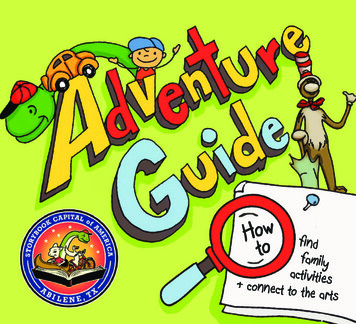
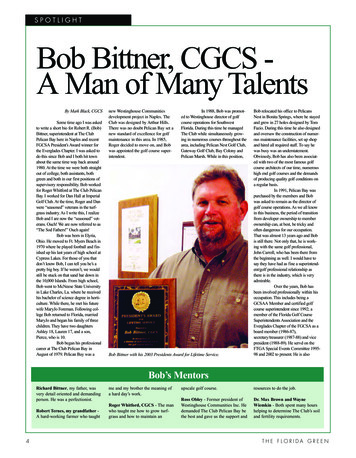

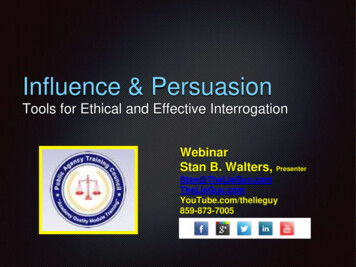
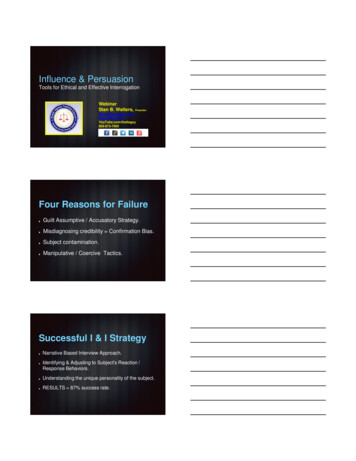
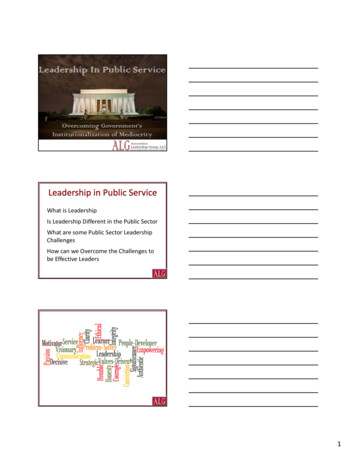

![[EPUB ] The Bob's Burgers Burger Book: Real .](/img/6/the-bob-039-s-burgers-burger-book-real-recipes-for-joke-burgers.jpg)

